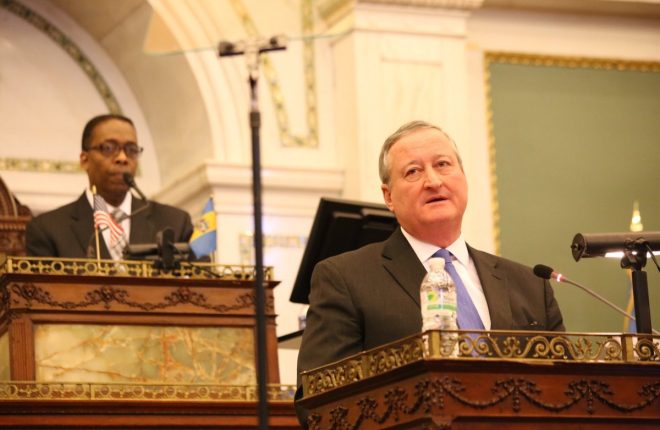We’re now in the second year of our Administration.
We’ve already seen amazing progress. Last year, together with City Council, we embarked on the largest series of anti-poverty measures in Philadelphia’s history.
Our most hard-won accomplishment was securing revenue through the Philadelphia Beverage Tax for pre-K, Community Schools, and Rebuild, the plan to invest in our parks, rec centers and libraries.
This year, we’ve increased access to quality pre-K programs to 2000 kids across the city at no cost to their families. At the same time, 88 pre-K providers, 75% of whom are minority or female small business owners, were able to expand and create over 250 jobs.
Nine community schools now exist, attending to the needs of kids and neighborhoods outside of the classroom through coordinated programs.
But our work is just beginning. Of the top ten major cities in America, Philadelphia ranks first in poverty and last in job creation. To reverse those statistics we have to take action.
If we want to build a city where every neighborhood is strong, we must provide our residents with the basic tools they need to be employable — and the jobs needed to employ them.
As a result, I’m asking City Council to invest in two areas in this year’s budget covering the next fiscal year (FY18), from July 2017 to June 2018: health and human services that will uplift our most vulnerable; and, job-creating initiatives that will create economic growth for all Philadelphians — especially for disconnected youth and those neighborhoods that have been left behind.
Read on for more details, explore the budget in our interactive open data tool, or check out the budget documents in our online resource center.
Health and Human Service Investments
Our health and human service investments are targeted at strengthening our child welfare system and combating lead poisoning, opioid addiction, and homelessness. Specifically, we propose:
- Funding 83 new housing units for the homeless.
- Doubling the number of homes the Health Department is able to inspect for lead poisoning risks each year.
- Increasing the number of lawyers handling DHS cases so we can enable a 30% decrease in their caseloads so that more permanent placements for our children can be achieved.
- Expanding the distribution of Naloxone, also known as Narcan, to 10,000 Philadelphians at risk of overdose.
- Launching other initiatives that will improve treatment options and prevent addiction.
Creating Economic Growth
Our proposed job-creating initiatives outlined in the budget are focused on building up our neighborhoods and assisting Philadelphians who face barriers to employment. We propose:
- Driving investment and jobs to all neighborhoods in Philadelphia. Right now, half of Philadelphia’s jobs are located in Center City and University City. The City must play a role in driving investment to other locations. Through Rebuild, Philadelphia has the opportunity to catalyze economic growth in dozens of communities.
- Redeveloping Penn’s Landing by finally reconnecting the city to its waterfront. The Capital Budget proposes significant funds for this project; if funded, it’s expected to bring in a return of $1.6 billion over the next 25 years.
- Continuing our commitment to neighborhood commercial corridors through $25 million in carry-forward and new investment.
- Implementing a new workforce development program called the “City as Model Employer.” This initiative is focused on assisting formerly incarcerated and justice-involved individuals, disconnected youth and young adults between the ages of 16 and 29, and adults lacking necessary workforce skills and credentials. The “City as Model Employer” program will connect 200 of these individuals who already work as seasonal or temporary City employees to bridge positions that will allow them to develop the skills required to secure and retain entry-level positions with the City or an employer partner.
- Continuing to reduce wage and business taxes. Over the past two decades, Philadelphia’s wage tax has steadily decreased; this trend must continue.
- Instituting pension reform. These efforts are critical to Philadelphia’s strength. We’re asking City Council to adopt our Administration’s plan to get the pension fund 80 percent funded in 13 years.
- Investing in mass transit and road repaving. This budget proposes an additional $30M investment in SEPTA over the next six years along with a $174M investment in road repaving that will allow Philadelphia to finally meet national standards.
- Dedicating funds to help implement Vision Zero.
- Using significant funds to strengthen the Philadelphia Fire Department.
- Continuing to give the Philadelphia Police Department the resources it needs for its commitment to transparency and to keep crime low. This budget provides the funds necessary to expand body cameras and make improvement to districts in high crime areas. We are also proposing a new, modern training facility for our corrections officers and to conduct a comprehensive analysis of all our violence prevention programs in order to improve their effectiveness.

